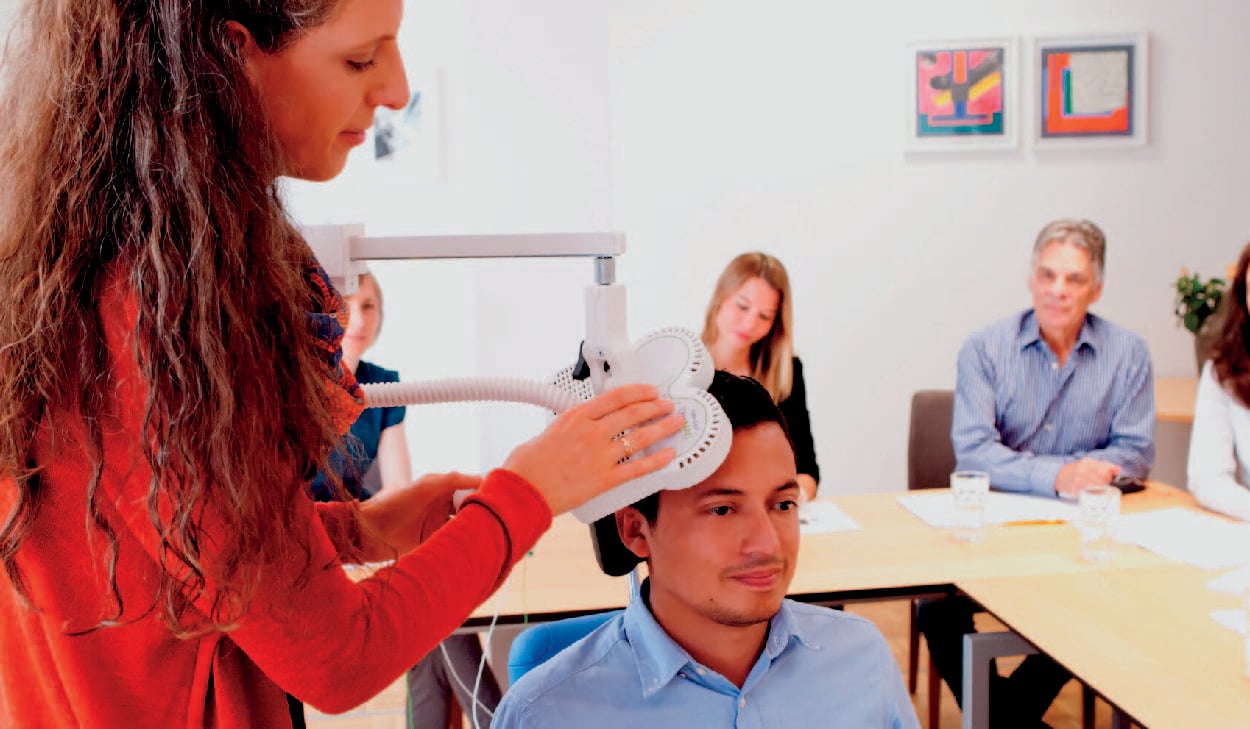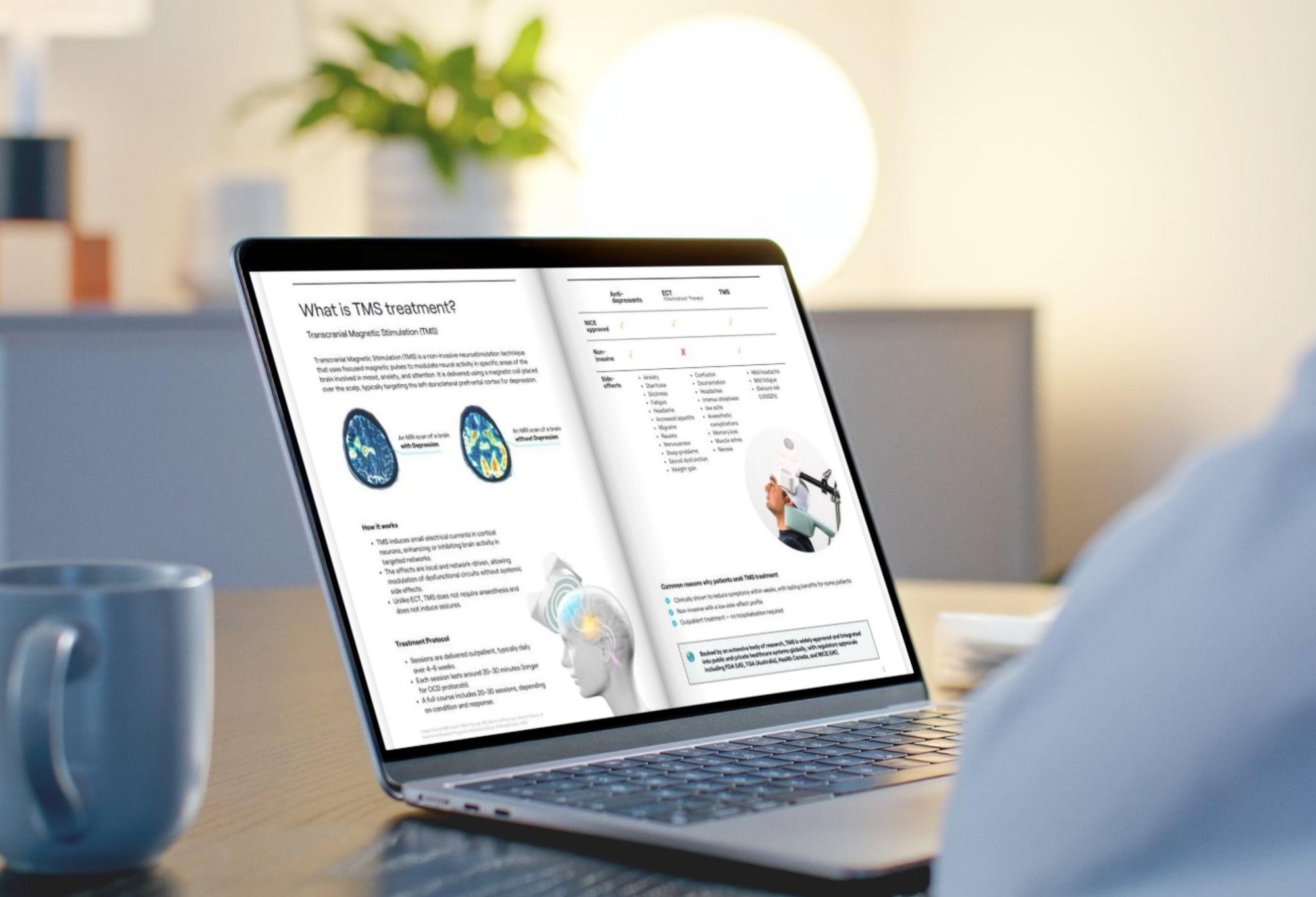Shared Care
For Psychiatrists

Straight to:
At Smart TMS, we recognise the important role you play in understanding your patient's needs. Our approach is to provide advanced TMS therapy while keeping you, as the referring psychiatrist, closely engaged in your patient’s ongoing care.
Shared Care
Our Shared Care Model invites psychiatrists to remain actively involved when referring patients to Smart TMS. As part of our multidisciplinary team, you have full insight into your patient’s TMS treatment and play a key role in their ongoing care.
Shared Care Model: A Collaborative Approach to Patient Recovery

At Smart TMS, we know effective mental health care depends on partnership, consistency, and ongoing communication. Our Shared Care Agreement is built to empower Psychiatrists who refer patients for TMS treatment—ensuring your clinical expertise stays at the heart of every patient’s journey.
We have seen that when referrals lack continuity, patients and their clinicians can feel disconnected from progress and aftercare. Our Shared Care Model keeps you informed and actively engaged at every stage of treatment.
How Our Shared Care Model Supports You:
Collaborative Approach: With patient consent, you join the Smart TMS multidisciplinary team, working closely with our TMS specialists and clinical leadership.
Daily Treatment Updates: Receive concise daily reports with progress notes and assessment scores, so you always know how your patient is responding.
Open Communication: Exchange feedback, medication updates, and clinical insights with our team. We consult you on any important safety or care matters.
Smooth Transition Post-Treatment: After therapy, you will receive a detailed discharge summary to seamlessly reintegrate the patient into your ongoing care plan.
Key Benefits:
- Stay closely connected and informed throughout your patient’s treatment.
- Support improved patient outcomes through coordinated and continuous care.
- Communicate efficiently while maintaining full clinical oversight.
With our Shared Care Model, you remain your patient’s trusted psychiatrist, supported by Smart TMS advanced expertise and resources. This collaborative approach doesn’t just maintain care—it enhances it.
Why Partner with Smart TMS?
- Enhance your practice with proven, advanced therapies.
- Deliver better results through an integrated care approach.
- Increase your revenue while maintaining clinical independence.
- Eliminate upfront investment, staffing concerns, and regulatory barriers.
- Support your patients throughout their entire treatment journey.
.jpg?width=1100&height=750&name=ADHD%20assessment%20(3).jpg)
Partnerships Guide
Conditions TMS treats
Depression
TMS compared to other treatments
| Treatment | TMS | ECT | Antidepressants |
|---|---|---|---|
| Description | Non-invasive magnetic fields | Electrical current to induce seizure | Oral medication |
| NICE approved | ✓ | ✓ | ✓ |
| Non-invasive | ✓ | ✘ | ✓ |
| Outpatient treatment | ✓ | ✘ | ✓ |
| Ongoing recovery | ✓ | ✘ | ✘ |
| Side-effects | Mild headaches Mild fatigue 1 in 50,000 risk of seizures |
Confusion Disorientation Headaches Intense sleepiness Jaw ache Anesthetic complications Memory loss Muscle aches Nausea |
Anxiety Diarrhoea Dizziness Fatigue Headache Increased appetite Migraine Nausea Nervousness Sleep problems Sexual dysfunction Weight gain |
"I have had the opportunity refer some of my patients to Smart TMS. The Patients have come back and fed back that they have had a very comprehensive assessment, detailed explanation for the treatment and its expected effects. It has been impressive to see the patients’ journey. My compliments for Smart TMS"
"I have referred a number of patients to Smart TMS and have been extremely pleased with the outcome. From the efficiency of the referral pathway through the treatment process and advice along the way to the discharge process and aftercare – all patients have reported how at ease and relaxed they felt by the team and were very pleased with the results. I have no hesitation in recommending Smart TMS"
"Everyone I dealt with was extremely friendly, helpful and supportive. Having suffered from treatment resistant depression, I feel I can now face so much of the major stressors in my life. This has been such a successful treatment for me and if you compare it to a recurring prescription of therapy, it works out so much more affordable without any side effects."
Transcranial Magnetic Stimulation FAQs
-
Repetitive Transcranial Magnetic Stimulation (or rTMS for short) is a treatment for depression, OCD, addictions and other mental health conditions. The rTMS machine emits high frequency magnetic pulses to the area of the brain known to cause the condition. The treatment stimulates the brain and causes ‘neuroplasticity’ – which is the brain’s ability to mend and build connections between the nerve cells. In the case of depression, for example, the left side of the prefrontal cortex is stimulated, restoring the connections to help it work as it should, without the symptoms of depression.
-
Although similar, rTMS is more commonly used. Repetitive Transcranial Magnetic Stimulation, which is the NICE approved treatment offered by Smart TMS, uses a magnet referred to by professionals as a ‘figure of eight coil’. This coil emits repetitive magnetic pulses to the specific area of the brain known to cause the condition being treated. In comparison, deep Transcranial Magnetic Stimulation, or dTMS, uses a ‘H-coil’, which looks like a helmet. The magnetic pulses are emitted on a much larger area of the brain as it’s much less focused than rTMS.
-
rTMS is a private treatment and costs vary depending on the condition being treated. An average course of treatment for depression with Smart TMS costs £3,000 and you are likely to need two courses in total.
-
As research progresses, it becomes clear that with regular maintenance sessions (one per month) the benefits of rTMS treatment are on-going. Life can have its ups and downs, but once we know that rTMS treatment works for you, we can offer “top up” sessions whenever you feel you need a boost.
-
There is no research to suggest that rTMS can cause memory loss. rTMS is often compared to ECT (electroconvulsive therapy), which does cause memory loss, however rTMS is non-invasive and only targets a small area of the brain, as opposed to inducing seizures like ECT does.
-
Yes – rTMS is effective in the treatment of Generalised Anxiety Disorder. At Smart TMS, we know that depression and anxiety often go hand in hand, so we offer all patients the opportunity to be treated for both at the same time. Other providers can charge separately for courses of depression and anxiety treatment, but we include them in the same treatment session, saving you (in some cases) thousands of pounds.
-
“Success” is hard to quantify when talking about mental health. The remission rate of patients suffering with depression at Smart TMS is 49%. This means 49% of patients are no longer clinically depressed following rTMS treatment. Our research shows that 56% patients also see a significant change in their mood, even if they don’t officially reach the point of remission, which helps them lead a happy and fulfilling life with fewer symptoms than before.
Professional Training & Partnership Opportunities
Learn more about professional training opportunities through neurocare academy and partnerships with Smart TMS clinics.










